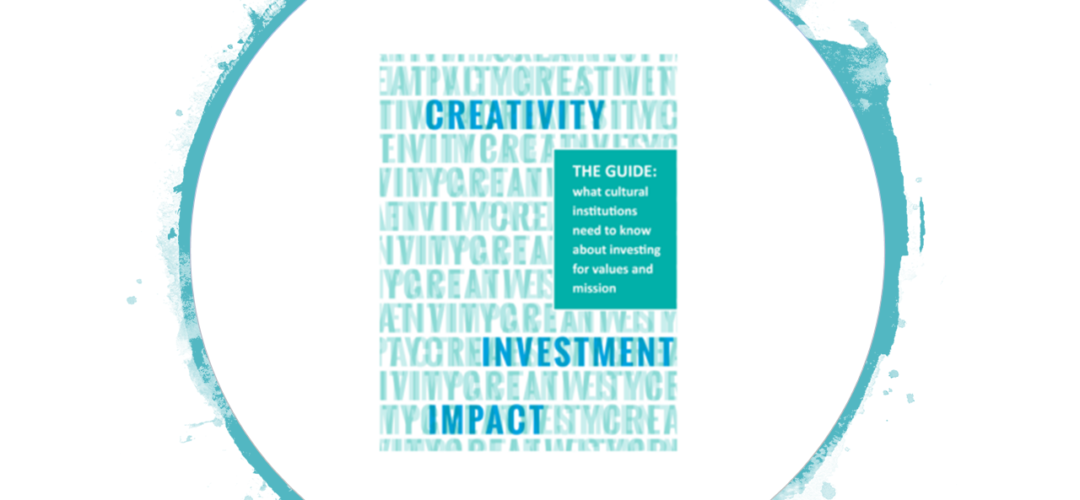Upstart Co-Lab and Rockefeller Philanthropy Advisors Release New Guide to Help Cultural Institutions Align Endowment Investments with Institutional Values and Mission
December 02, 2020
NEW YORK, NY, December 2, 2020 – In collaboration with Rockefeller Philanthropy Advisors, Upstart Co- Lab today released The Guide: what cultural institutions need to know about investing for values and mission, a practical road map to impact investing that leverages case studies, data, and insights garnered from across the contemporary cultural and financial landscape. Cultural institutions across the country face a growing chorus of questions about how they invest the collective $58 billion held in their endowments, while also confronting significant and unexpected financial operating shortfalls as a result of the COVID-19 pandemic. The Guide lays out a path for museums and other cultural institutions to transition to morally and fiscally sound investment strategies that build long-term financial health for individual organizations, their surrounding communities, and the arts and culture ecosystem as a whole.
The research laid out in The Guide makes the case that cultural institutions can align their money with their values and mission without sacrificing financial return. The Guide provides examples of peer institutions already engaged in impact investing including foundations, universities, and nonprofit organizations as well as cultural institutions including the American Museum of Natural History, Andy Warhol Foundation for the Visual Arts, Arts Council England, Brooklyn Museum, California Institute of the Arts, Creative Capital, Field Museum, Louvre Museum, MASS MoCA, Souls Grown Deep Foundation & Community Partnership, and Walters Art Museum. Written accessibly for novices, The Guide provides everything from introductory terminology to step-by-step instructions on how institutions can begin to explore impact investing.
“As the creative sector builds back better from the COVID-19 crisis, cultural institutions can realize the power of their balance sheet to amplify mission and values. Museums, art schools, and others are beginning to join foundations, universities, and nonprofit peers as impact investors. The Guide celebrates first-mover cultural institutions that are demonstrating how the creative sector can be a source of impact capital as well as a use of impact capital, making social and environmental impact alongside financial return,” said Laura Callanan, Founding Partner of Upstart Co-Lab.
Melissa Berman, President of Rockefeller Philanthropy Advisors, added, “Impact investing is now a recommended best practice that has a unique position alongside philanthropy to fuel the kind of systems change we need to solve deeply persistent challenges and inequities. Given our commitment to creating more thoughtful and effective practices for those seeking to have a positive impact on society, we are thrilled to be able to offer a new resource specific to endowment investing for cultural institutions.”
Dispelling the misconception that impact investing results in lower financial returns, The Guide demonstrates the accelerated adoption of ESG (Environmental, Social, and Corporate Governance) investing strategies, provides a summary of sustainable and impact investment financial performance by asset class and institutional investor type, and reaffirms the resilience of these strategies even through the market uncertainty caused by COVID-19 this year. It also makes the case for cultural institutions to invest in the creative economy, encompassing ethical fashion, sustainable food, social impact media, creative places, and other creative businesses. Highlighting how impact investing can help organizations put new and renewed diversity, equity, and inclusion commitments into action, it is an essential resource for cultural institutions navigating the new realities of 2020 and beyond.
On her institution’s experience transitioning to impact investing, Julia Marciari-Alexander, Executive Director of the Walters Art Museum in Baltimore, MD, said, “Since 2015, impact investing has become a core strategy to achieve our mission to be a transformative force in our community. Just as we expected at the outset of the initiative, we have seen high performance results in both our financial returns and our diversity goals through our impact investment strategies, and we hope our example can help inspire others to take those first steps towards mission-related investing.”
The Guide expands on Upstart Co-Lab’s mission to disrupt how creativity is funded by connecting the $17 trillion of socially responsible and impact investing capital in the U.S. to America’s $878 billion creative economy. Impact investors have begun to recognize the potential of the creative economy to positively benefit low-income communities, workers, women- and BIPOC-owned businesses, and the planet. The Guide is the latest addition to Upstart’s arsenal of original research and tools for impact investing available for free online at upstartco-lab.org/resources.
About Upstart Co-Lab
Upstart Co-Lab believes creative people solve problems, and is disrupting how creativity is funded by connecting impact investing to the creative economy. Since 2016, Upstart Co-Lab has helped impact investors who understand the power of art, design, culture, heritage, and creativity see opportunities that align with their values. By mobilizing impact capital, Upstart Co-Lab is helping shape a more diverse, equitable and sustainable creative economy. For more information, visit upstartco-lab.org.
Back to News


